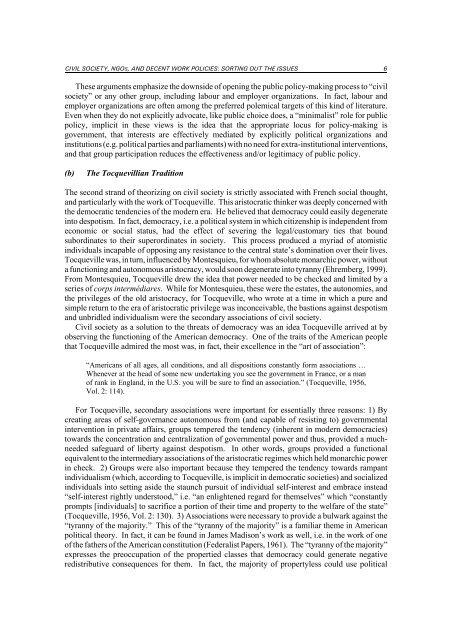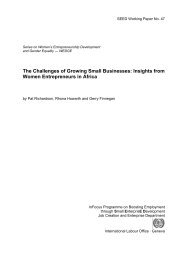Civil Society, NGOs, and Decent Work Policies: Sorting out the Issues
Civil Society, NGOs, and Decent Work Policies: Sorting out the Issues
Civil Society, NGOs, and Decent Work Policies: Sorting out the Issues
Create successful ePaper yourself
Turn your PDF publications into a flip-book with our unique Google optimized e-Paper software.
CIVIL SOCIETY, NGOS, AND DECENT WORK POLICIES: SORTING OUT THE ISSUES 6<br />
These arguments emphasize <strong>the</strong> downside of opening <strong>the</strong> public policy-making process to “civil<br />
society” or any o<strong>the</strong>r group, including labour <strong>and</strong> employer organizations. In fact, labour <strong>and</strong><br />
employer organizations are often among <strong>the</strong> preferred polemical targets of this kind of literature.<br />
Even when <strong>the</strong>y do not explicitly advocate, like public choice does, a “minimalist” role for public<br />
policy, implicit in <strong>the</strong>se views is <strong>the</strong> idea that <strong>the</strong> appropriate locus for policy-making is<br />
government, that interests are effectively mediated by explicitly political organizations <strong>and</strong><br />
institutions (e.g. political parties <strong>and</strong> parliaments) with no need for extra-institutional interventions,<br />
<strong>and</strong> that group participation reduces <strong>the</strong> effectiveness <strong>and</strong>/or legitimacy of public policy.<br />
(b)<br />
The Tocquevillian Tradition<br />
The second str<strong>and</strong> of <strong>the</strong>orizing on civil society is strictly associated with French social thought,<br />
<strong>and</strong> particularly with <strong>the</strong> work of Tocqueville. This aristocratic thinker was deeply concerned with<br />
<strong>the</strong> democratic tendencies of <strong>the</strong> modern era. He believed that democracy could easily degenerate<br />
into despotism. In fact, democracy, i.e. a political system in which citizenship is independent from<br />
economic or social status, had <strong>the</strong> effect of severing <strong>the</strong> legal/customary ties that bound<br />
subordinates to <strong>the</strong>ir superordinates in society. This process produced a myriad of atomistic<br />
individuals incapable of opposing any resistance to <strong>the</strong> central state’s domination over <strong>the</strong>ir lives.<br />
Tocqueville was, in turn, influenced by Montesquieu, for whom absolute monarchic power, with<strong>out</strong><br />
a functioning <strong>and</strong> autonomous aristocracy, would soon degenerate into tyranny (Ehremberg, 1999).<br />
From Montesquieu, Tocqueville drew <strong>the</strong> idea that power needed to be checked <strong>and</strong> limited by a<br />
series of corps intermédiares. While for Montesquieu, <strong>the</strong>se were <strong>the</strong> estates, <strong>the</strong> autonomies, <strong>and</strong><br />
<strong>the</strong> privileges of <strong>the</strong> old aristocracy, for Tocqueville, who wrote at a time in which a pure <strong>and</strong><br />
simple return to <strong>the</strong> era of aristocratic privilege was inconceivable, <strong>the</strong> bastions against despotism<br />
<strong>and</strong> unbridled individualism were <strong>the</strong> secondary associations of civil society.<br />
<strong>Civil</strong> society as a solution to <strong>the</strong> threats of democracy was an idea Tocqueville arrived at by<br />
observing <strong>the</strong> functioning of <strong>the</strong> American democracy. One of <strong>the</strong> traits of <strong>the</strong> American people<br />
that Tocqueville admired <strong>the</strong> most was, in fact, <strong>the</strong>ir excellence in <strong>the</strong> “art of association”:<br />
“Americans of all ages, all conditions, <strong>and</strong> all dispositions constantly form associations …<br />
Whenever at <strong>the</strong> head of some new undertaking you see <strong>the</strong> government in France, or a man<br />
of rank in Engl<strong>and</strong>, in <strong>the</strong> U.S. you will be sure to find an association.” (Tocqueville, 1956,<br />
Vol. 2: 114).<br />
For Tocqueville, secondary associations were important for essentially three reasons: 1) By<br />
creating areas of self-governance autonomous from (<strong>and</strong> capable of resisting to) governmental<br />
intervention in private affairs, groups tempered <strong>the</strong> tendency (inherent in modern democracies)<br />
towards <strong>the</strong> concentration <strong>and</strong> centralization of governmental power <strong>and</strong> thus, provided a muchneeded<br />
safeguard of liberty against despotism. In o<strong>the</strong>r words, groups provided a functional<br />
equivalent to <strong>the</strong> intermediary associations of <strong>the</strong> aristocratic regimes which held monarchic power<br />
in check. 2) Groups were also important because <strong>the</strong>y tempered <strong>the</strong> tendency towards rampant<br />
individualism (which, according to Tocqueville, is implicit in democratic societies) <strong>and</strong> socialized<br />
individuals into setting aside <strong>the</strong> staunch pursuit of individual self-interest <strong>and</strong> embrace instead<br />
“self-interest rightly understood,” i.e. “an enlightened regard for <strong>the</strong>mselves” which “constantly<br />
prompts [individuals] to sacrifice a portion of <strong>the</strong>ir time <strong>and</strong> property to <strong>the</strong> welfare of <strong>the</strong> state”<br />
(Tocqueville, 1956, Vol. 2: 130). 3) Associations were necessary to provide a bulwark against <strong>the</strong><br />
“tyranny of <strong>the</strong> majority.” This of <strong>the</strong> “tyranny of <strong>the</strong> majority” is a familiar <strong>the</strong>me in American<br />
political <strong>the</strong>ory. In fact, it can be found in James Madison’s work as well, i.e. in <strong>the</strong> work of one<br />
of <strong>the</strong> fa<strong>the</strong>rs of <strong>the</strong> American constitution (Federalist Papers, 1961). The “tyranny of <strong>the</strong> majority”<br />
expresses <strong>the</strong> preoccupation of <strong>the</strong> propertied classes that democracy could generate negative<br />
redistributive consequences for <strong>the</strong>m. In fact, <strong>the</strong> majority of propertyless could use political
















